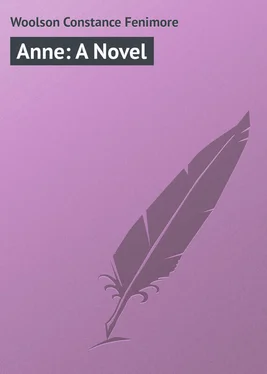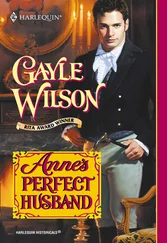Constance Woolson - Anne - A Novel
Здесь есть возможность читать онлайн «Constance Woolson - Anne - A Novel» — ознакомительный отрывок электронной книги совершенно бесплатно, а после прочтения отрывка купить полную версию. В некоторых случаях можно слушать аудио, скачать через торрент в формате fb2 и присутствует краткое содержание. Жанр: Классический детектив, foreign_detective, foreign_prose, на английском языке. Описание произведения, (предисловие) а так же отзывы посетителей доступны на портале библиотеки ЛибКат.
- Название:Anne: A Novel
- Автор:
- Жанр:
- Год:неизвестен
- ISBN:нет данных
- Рейтинг книги:5 / 5. Голосов: 1
-
Избранное:Добавить в избранное
- Отзывы:
-
Ваша оценка:
- 100
- 1
- 2
- 3
- 4
- 5
Anne: A Novel: краткое содержание, описание и аннотация
Предлагаем к чтению аннотацию, описание, краткое содержание или предисловие (зависит от того, что написал сам автор книги «Anne: A Novel»). Если вы не нашли необходимую информацию о книге — напишите в комментариях, мы постараемся отыскать её.
Anne: A Novel — читать онлайн ознакомительный отрывок
Ниже представлен текст книги, разбитый по страницам. Система сохранения места последней прочитанной страницы, позволяет с удобством читать онлайн бесплатно книгу «Anne: A Novel», без необходимости каждый раз заново искать на чём Вы остановились. Поставьте закладку, и сможете в любой момент перейти на страницу, на которой закончили чтение.
Интервал:
Закладка:
The Reverend James Gaston was an Englishman by birth. On coming to America he had accepted a chaplaincy in the army, with the intention of resigning it as soon as he had become sufficiently familiar with the ways of the Church in this country to feel at ease in a parish. But years had passed, and he was a chaplain still; for evidently the country parishes were not regulated according to his home ideas, the rector's authority – yes, even the tenure of his rectorship – being dependent upon the chance wills and fancies of his people. Here was no dignity, no time for pleasant classical studies, and no approval of them; on the contrary, a continuous going out to tea, and a fear of offending, it might be, a warden's wife, who very likely had been brought up a Dissenter. The Reverend James Gaston therefore preferred the government for a master.
Dr. Gaston held the office of post chaplain, having been, on application, selected by the council of administration. He had no military rank, but as there happened to be quarters to spare, a cottage was assigned to him, and as he had had the good fortune to be liked and respected by all the officers who had succeeded each other on the little island, his position, unlike that of some of his brethren, was endurable, and even comfortable. He had been a widower for many years; he had never cared to marry again, but had long ago recovered his cheerfulness, and had brought up, intellectually at least, two children whom he loved as if they had been his own – the boy Erastus Pronando, and Anne Douglas. The children returned his affection heartily, and made a great happiness in his lonely life. The girl was his good scholar, the boy his bad one; yet the teacher was severe with Anne, and indulgent to the boy. If any one had asked the reason, perhaps he would have said that girls were docile by nature, whereas boys, having more temptations, required more lenity; or perhaps that girls who, owing to the constitution of society, never advanced far in their studies, should have all the incitement of severity while those studies lasted, whereas boys, who are to go abroad in the world and learn from life, need no such severity. But the real truth lay deeper than this, and the chaplain himself was partly conscious of it; he felt that the foundations must be laid accurately and deeply in a nature like that possessed by this young girl.
"Good-morning, uncle," said Anne, entering and putting down her Latin books (as children they had adopted the fashion of calling their teacher "uncle"). "Was your coffee good this morning?"
"Ah, well, so-so, child, so-so," replied the chaplain, hardly aroused yet from his problem.
"Then I must go out and speak to – to – what is this one's name, uncle?"
"Her name is – here, I have it written down – Mrs. Evelina Crangall," said the chaplain, reading aloud from his note-book, in a slow, sober voice. Evidently it was a matter of moment to him to keep that name well in his mind.
Public opinion required that Dr. Gaston should employ a Protestant servant; no one else was obliged to conform, but the congregation felt that a stand must be made somewhere, and they made it, like a chalk line, at the parson's threshold. Now it was very well known that there were no Protestants belonging to the class of servants on the island who could cook at all, that talent being confined to the French quarter-breeds and to occasional Irish soldiers' wives, none of them Protestants. The poor parson's cooking was passed from one incompetent hand to another – lake-sailors' wives, wandering emigrants, moneyless forlorn females left by steamers, belonging to that strange floating population that goes forever travelling up and down the land, without apparent motive save a vague El-Dorado hope whose very conception would be impossible in any other country save this. Mrs. Evelina Crangall was a hollow-chested woman with faded blue eyes, one prominent front tooth, scanty light hair, and for a form a lattice-work of bones. She preserved, however, a somewhat warlike aspect in her limp calico, and maintained that she thoroughly understood the making of coffee, but that she was accustomed to the use of a French coffee-pot. Anne, answering serenely that no French coffee-pot could be obtained in that kitchen, went to work and explained the whole process from the beginning, the woman meanwhile surveying her with suspicion, which gradually gave way before the firm but pleasant manner. With a long list of kindred Evelinas, Anne had had dealings before. Sometimes her teachings effected a change for the better, sometimes they did not, but in any case the Evelinas seldom remained long. They were wanderers by nature, and had sudden desires to visit San Francisco, or to "go down the river to Newerleens." This morning, while making her explanation, Anne made coffee too. It was a delicious cupful which she carried back with her into the library, and the chaplain, far away in the chess country, came down to earth immediately in order to drink it. Then they opened the Latin books, and Anne translated her page of Livy, her page of Cicero, and recited her rules correctly. She liked Latin; its exactness suited her. Mrs. Bryden was wrong when she said that the girl studied Greek. Dr. Gaston had longed to teach her that golden tongue, but here William Douglas had interfered. "Teach her Latin if you like, but not Greek," he said. "It would injure the child – make what is called a blue-stocking of her, I suppose – and it is my duty to stand between her and injury."
"Ah! ah! you want to make a belle of her, do you?" said the cheery chaplain.
"I said it was my duty; I did not say it was my wish," replied the moody father. "If I could have my wish, Anne should never know what a lover is all her life long."
"What! you do not wish to have her marry, then? There are happy marriages. Come, Douglas, don't be morbid."
"I know what men are. And you and I are no better."
"But she may love."
"Ah! there it is; she may. And that is what I meant when I said that it was my duty to keep her from making herself positively unattractive."
"Greek need not do that," said Dr. Gaston, shortly.
"It need not, but it does. Let me ask you one question: did you ever fall in love, or come anywhere near falling in love, with a girl who understood Greek?"
"That is because only the homely ones take to it," replied the chaplain, fencing a little.
But Anne was not taught Greek. After Cicero she took up algebra, then astronomy. After that she read aloud from a ponderous Shakspeare, and the old man corrected her accentuation, and questioned her on the meanings. A number of the grand old plays the girl knew almost entirely by heart; they had been her reading-books from childhood. The down-pouring light of the vivid morning sunshine and the up-coming white glare of the ice below met and shone full upon her face and figure as she bent over the old volume laid open on the table before her, one hand supporting her brow, the other resting on the yellow page. Her hands were firm, white, and beautifully shaped – strong hands, generous hands, faithful hands; not the little, idle, characterless, faithless palms so common in America, small, dainty, delicate, and shapeless, coming from a composite origin. Her thick hair, brown as a mellowed chestnut, with a gleam of dark red where the light touched it, like the red of November oak leaves, was, as usual, in her way, the heavy braids breaking from the coil at the back of her head, one by one, as she read on through Hamlet . At last impatiently she drew out the comb, and they all fell down over her shoulders, and left her in momentary peace.
The lesson was nearly over when Rast Pronando appeared; he was to enter college – a Western college on one of the lower lakes – early in the spring, and that prospect made the chaplain's lessons seem dull to him. "Very likely they will not teach at all as he does; I shall do much better if I go over the text-books by myself," he said, confidentially, to Anne. "I do not want to appear old-fashioned, you know."
Читать дальшеИнтервал:
Закладка:
Похожие книги на «Anne: A Novel»
Представляем Вашему вниманию похожие книги на «Anne: A Novel» списком для выбора. Мы отобрали схожую по названию и смыслу литературу в надежде предоставить читателям больше вариантов отыскать новые, интересные, ещё непрочитанные произведения.
Обсуждение, отзывы о книге «Anne: A Novel» и просто собственные мнения читателей. Оставьте ваши комментарии, напишите, что Вы думаете о произведении, его смысле или главных героях. Укажите что конкретно понравилось, а что нет, и почему Вы так считаете.












